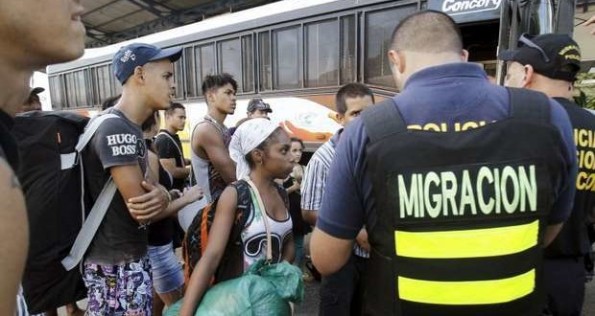Ivan Garcia, Costa Rica, 7 December 2015 — For Jorge Echevarria, 25, it all started one morning in La Vibora, a neighborhood in south Havana, when a woman friend, through a telephone connection via the internet, put him in contact with an Ecuadorian coyote.
“For six years I had been trying to leave Cuba. Three times I jumped on a raft. I was always caught by the US Coast Guard. It was then that I decided to travel to Ecuador and try the route through several Central American countries,” said Echevarria, while waiting for the bus to take him to a shelter in San Ramon, an hour from the Costa Rican capital.
According to Jorge, in Colombia he was stripped of the money he was carrying. “Around $4,000. I hid it in different places on my body and in the lining of a backpack. They left me without a cent. When I got to Paso Canoas, I hadn’t eaten for three days. Just some water and fruit I found along the road.”
The majority of Cubans stranded in Costa Rica agree that their greatest enemies are the coyotes, the ELN and FARC gunmen and guerrillas in Colombia. “These people don’t fuck around. If you don’t let go of the money they shoot you. They are armed illiterates. Assassins for pleasure,” says Echevarria, sitting on the platform of an old bus station in Paso Canoas, Costa Rica.
Several of those interviewed by Marti Noticias said that to start the journey you need at least between $5,000 and $8,000 dollars. Also a bit of luck and always travel in groups.
When you chat with them, you can see the danger they have faced along the way in their tired eyes and the stories they tell. Magda, a lady with dyed blonde hair had had a beauty parlor in Puerto Padre, Las Tunas, about 400 miles northeast of Havana.
Things were going well for me. I earned 90 to 100 convertible pesos a month (100-110 dollars), which is enough in Cuba. But there is no future my son. I am the mother of a 21-year-old son who every night reminded me he wanted to get out of this shit,” she says, seated on a wooden stool in Paso Canoas.
Magda says that in her group a young Cuban woman was kidnapped by Colombian assassins. “We paid money to pass and they told us, ‘the girl is staying with us.’ They raped her. The trip is very hard. But I don’t regret it.”
Alfredo Avila, 28, an electrical engineer in Holguin, left his wife and son in Cuba. And also a half-built house. His dream is to settle in the United States, work hard and be able to get his family out.
He was able to raise the money, “in more or less illegal businesses and with the sale of a house. A relative who lives in Miami, on one of his trip to Cuba, I gave him 10,000 dollars, which he is doling out to me. The plan was simple. Friends in Holguin gave me contacts in Ecuador. To prepare for my flight, I went to Quito twice. When I decided, I made contact with Ecuadorian coyotes. The journey is difficult and dangerous. The ideal thing is to travel with little money. And hide it as well as possible,” Avila said, in the entry hall of the shabby hostel in El Azteca.
Eddy Alfonso Rubio, 29, a food technician, lived in the coastal village of Santa Cruz del Norte, in Mayabeque province. Although the journey was complicated, now in Costa Rica, he is more relaxed and drinks one beer after another without stopping.
“I was a bartender in a State restaurant. I saved money from the tips and other businesses. I left my wife and one daughter in Cuba. Raul Castro’s economic reforms haven’t benefited the majority of the people. There (the island) there is no solution. The best thing to do is leave. As soon as possible,” he says.
When you ask them about political issues, the Cuban “land rafters” put on long faces. At a viewpoint in La Cruz village three women sitting on the floor don’t want to talk about it.
“You’re nuts. It they pit us against each other, those people give us the bill,” she said. A blue-eyed mixed-race woman and another friend talked in whispers. “It they would give us a visa for speaking out against the government, they would have to beat us off with sticks to get us to shut up,” they commented in a La Cruz park.
Most Cubans when traveling by land are very cautious when it comes time to talk politics. Away from the cameras they admit that the Castro regime is the one at fault for Cuba’s economic madhouse.
But in front of a microphone everything is justifications. Like two friends at the entrance to the shelter in the La Cruz settlement. “I left family in Cuba,” one justifies. And the other claims, “If I say things the government doesn’t like they may not let me enter the country.”
Joan Carbonell, 24, is a graduate in computer science. He worked on the website of the official newspaper Juventud Rebelde (Rebel Youth) and is doubly suspicious. Before giving his opinion he asked a woman friend from the newspaper, using a data connection on his mobile phone, to check out the journalist’s profile.
Then, by way of an excuse, he said, “Sir, I have nothing against you, but you work for Radio and TV Marti. And speaking to the camera could bring future consequences for me in Cuba.”
Beyond the effort, and the cost in money, on their march by land to the United States, thus new wave of Cuban emigrants carries fear in their backpacks. A Fidel Castro in plainclothes that many cannot overcome.

